Arabic Joomla SEO
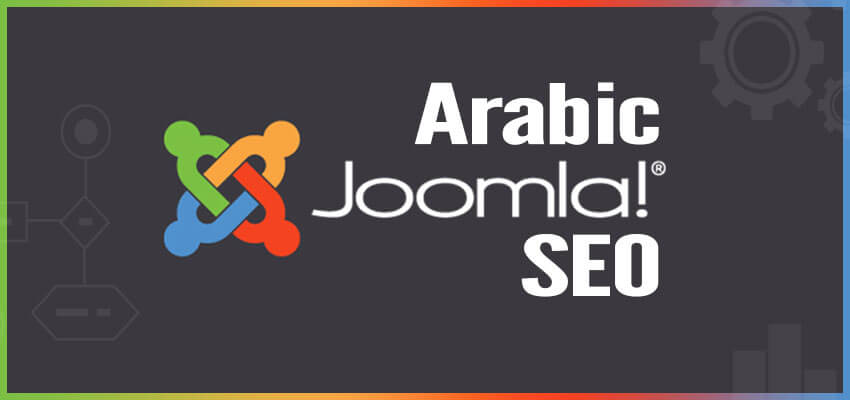
This definitive guide explains the most important things any business or brand needs to know for the most effective Arabic Joomla SEO. Pay close attention to these steps and whether you are starting a site from scratch or revamping the content of your current one, you will learn the most effective strategies to reach internet success for your business.
Contextualizing Joomla in the Online Landscape
Since its inception in 2005, Joomla has offered users a free and open-source content management system (CMS) for creating, managing, and publishing websites and their content. Its creation has been driven by the many programmers and volunteers who contribute their energy towards building a quality digital infrastructure that can be tailored to users’ needs such as plugins, extensions, templates, and more. As a result of this care over the past 15+ years, Joomla has many features that users love, like page caching, RSS feeds, blogs, search, and support for foreign languages, particularly with non-Latin scripts. In 2020, many web-experts have called Joomla the third most common open-source CMS on the web, trailing both WordPress and Shopify.
Joomla’s Valuable Multilingual Capabilities and Support
Out of the many CMS options to consider while building a site, Joomla could be the most multilingual-friendly of them all. The CMS platform has been used to create many websites in government, corporate, small business, e-commerce, community sectors, amongst others. Notably, many of these websites are not in the English language, reaching audiences in dozens of countries globally. With more than 70 robust language translation packs ready for out-of-the-box use, it is no wonder that many foreign websites utilize Joomla’s services. Joomla particularly has been a choice favorite for Arabic web development, as it makes the challenges associated with right to left sites and non-Latin scripts easier to overcome.
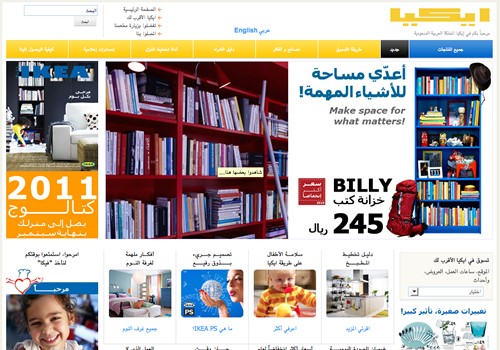
Many international companies develop their Arabic websites to reach Arab markets on the Joomla platform, like Ikea and the Bosnia and Herzegovina Tourism sites pictured above.
Templates and Arabic Compatibility
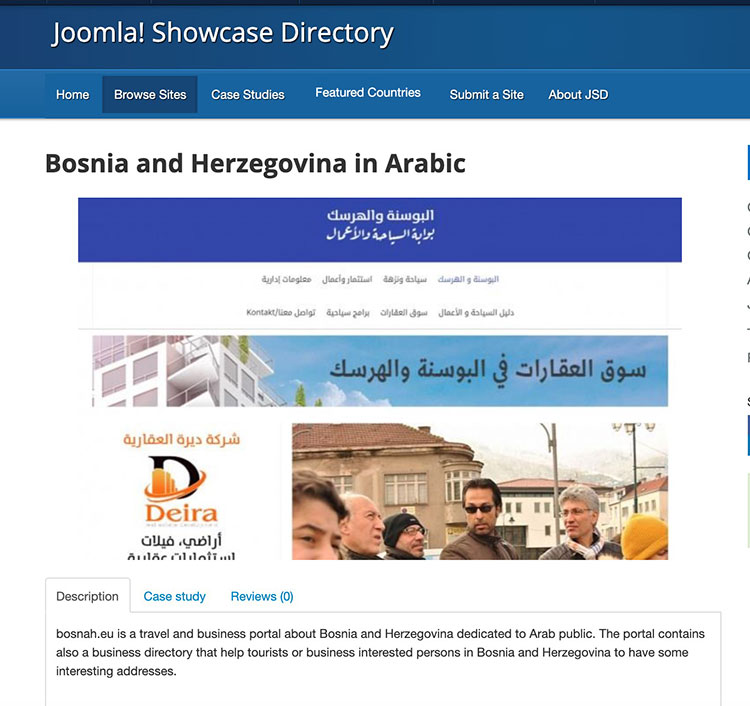
The main reason users love Joomla so much is because it is extremely user-friendly. Whether you are a small business getting started with an online presence, a university student, or a big corporation, you can make Joomla work for your needs. One of the places where this is most evident is in the physical appearance of your site. Called themes on other platforms, Joomla’s templates provide out-of-the-box layout options for other sites to copy and customize with their own data and content. Browse the Joomla template gallery to find thousands of free and paid examples to find the perfect one for your site.
However, there is an important consideration when it comes to Arabic. Arabic is different from English as it is read from right to left (RTL). Accordingly, you must find a template that supports this layout and configuration (many templates are NOT compatible). Many sites simply translate their content into Arabic without fixing the text arrangement. Navigating your site would thus be too challenging for Arabs. As you are deciding which is perfect for how you want your site to appear, do the background research so you are prepared to provide an optimized experience for potential customers.
In many cases, you will have to go into the back end of the site to manually change the code to reflect RTL styling. If you have programming experience, this should be straightforward. If you do not, we encourage you to set up your site with a programmer with a background in making RTL sites.
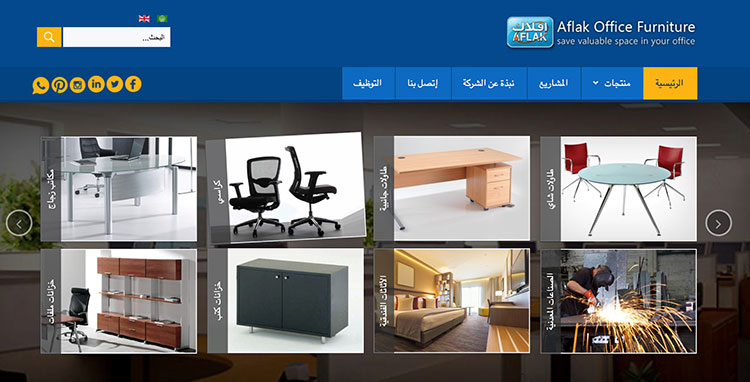
https://aflak-of.com/en/ is another example of an Arabic language site that is built through Joomla
Downloading Useful Extensions
Joomla calls the applications you can integrate into your site extensions instead of plug-ins. These thousands of options add additional functionality to your website and provide services the out-of-the-box software does not include. Luckily, all the extensions are easily searchable through Joomla’s Extensions Directory. The following is a screenshot of the Arabic results page, showing a few of the many options that are used on Arabic language sites. The two examples are used for translating page content into Arabic language numbers and dates.
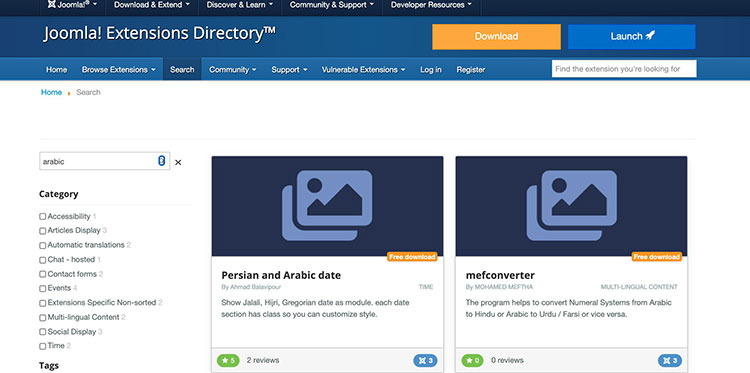
Create Engaging Content that Arabic Speakers are Interested in
One of the most critical steps for SEO is doing Arabic keyword research. You need to be strategic in this process to best determine what your target market’s main interests are. Once you have used data to derive these topics, you must think about how to produce content that fills these information gaps in the digital sphere. Your site pages should be restructured around the identified terms. After the site map has been structured, quality and informational content should be built out on each page. You can do all SEO steps correctly, but unless your content is actually of interest to the target audience, you will not have much success.
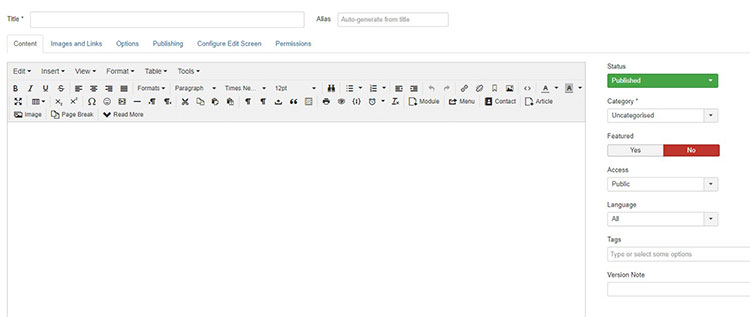
Screenshot of Joomla’s text editor
Manual Translation vs Machine Translation
When you are building your Arabic language content, do not merely copy and paste the English text into a translation website or application. The Arabic language is very intricate with its grammatical case, vowel usage, and order of sentence structure. There are also many different dialects of Arabic, depending on different parts of the Middle East. For example, the Darija Arabic spoken in Morocco is leagues different from what is found in the Quran. To create engaging content, you need to be able to appeal to your target audience in a tone and manner that they can relate to. Machine translation cannot accomplish this highly nuanced requirement. Only a human with a background in Arabic can effectively conduct this translation.
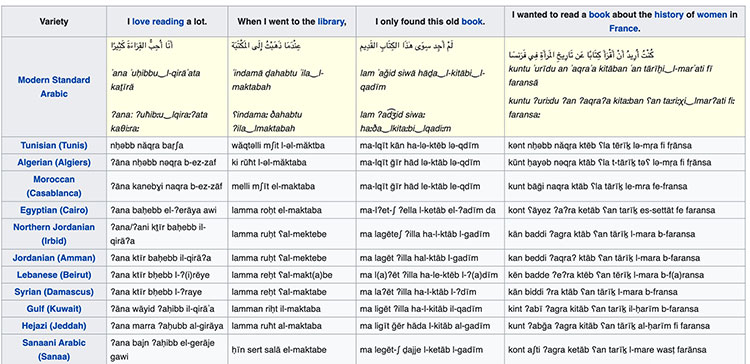
This table shows how much simple phrases differ depending on Arab countries’ respective dialects of Arabic.
Translated Content vs SEO Optimized Arabic Content
The wants and needs of people in Saudi Arabia might not be the same as the needs of people in Algeria. Content needs to be specifically identified by someone with a background in market trends in the Arab world. These specialists can tell you what the keywords are and what subjects are popular, allowing you to create moving content that will be effective in getting more clicks on your pages. They will also help you translate your content needs into compelling Arabic built around keyword phrases. Investing up-front in a Middle Eastern SEO specialist will have a massive impact on your business in the long run. Their skills, background, and language abilities will set you apart from both translated content and non-SEO optimized content.
Optimized Arabic Titles, Meta Descriptions, and URL
With this new, optimized content you are going to create, you will need to create new web pages that incorporate the findings of your keyword research. All of these webpages need to be optimized not solely through content, but also through titles, meta descriptions, and images. In fact, these four descriptors make up the essential DNA of each webpage and require sharp attention. Even if your site makes it to the first page of Google search, people are not going to click unless their split-second judgment of your page aligns with what they are searching for.
The following search result from our company is an example of an optimized title, URL, and meta description. From this, you can clearly tell what the article is about in simple but descriptive terms. Ensure each one of your pages has these crucial descriptors in their DNA as well.
Joomla’s Arabic Community
Unlike bigger CMses, Joomla’s smaller customer base allows it to develop a tight-knit community with users searching to help and support each other. There are two official Joomla user groups in the Arab world, one in Alexandria and one in Jeddah. Conducted in Arabic, these meet-and-greets bring users together from across the Middle East to share best practices in developing an effective RTL site. If you live in Egypt or Saudi Arabia, we encourage you to try one
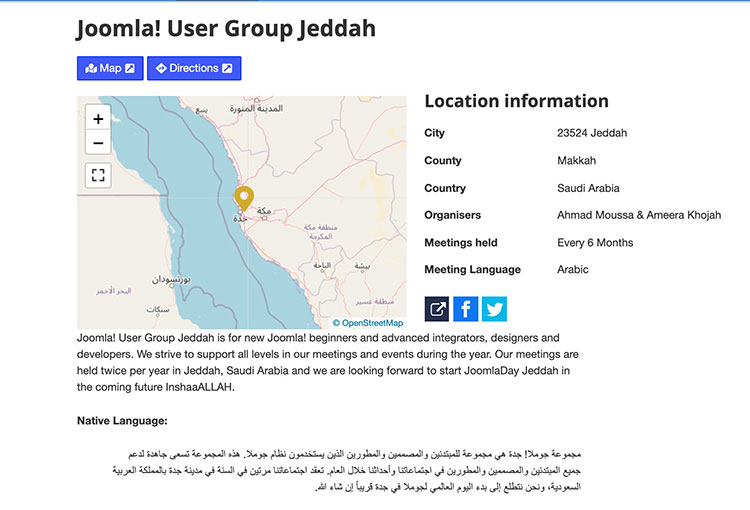
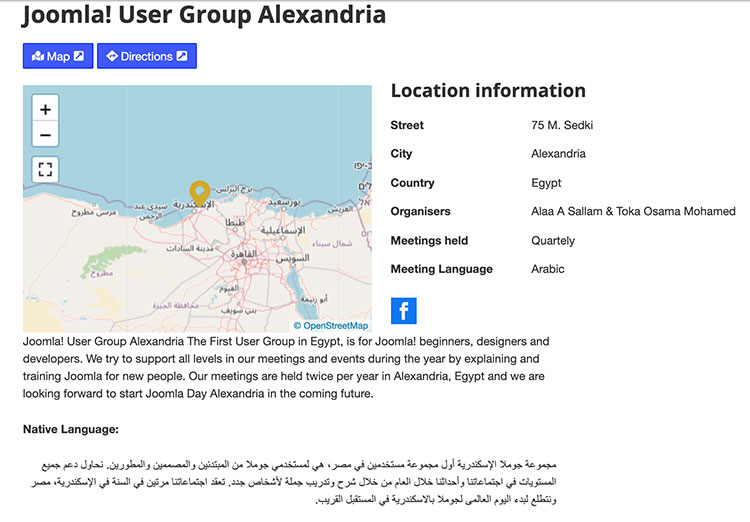
Final Thoughts on Joomla
Though Joomla has catered to user needs since its inception, the CMS platform has had a hard time keeping up with its competitors, being over-shined by bigger platforms like WordPress and Shopify. However, the one competitive advantage Joomla maintains over other platforms is its ability to give high-quality support to sites with multilingual functionality, particularly those in Arabic. If you already have a Joomla site, integrating the above is an absolute must if you want to rank well with SEO. If you have decided you want to either migrate to the Joomla platform from your current site, ensure these steps are a part of your transformation process. If you want to learn more about Arabic SEO on other CMSes, check out our WordPress, Drupal, and Sitecore articles.
